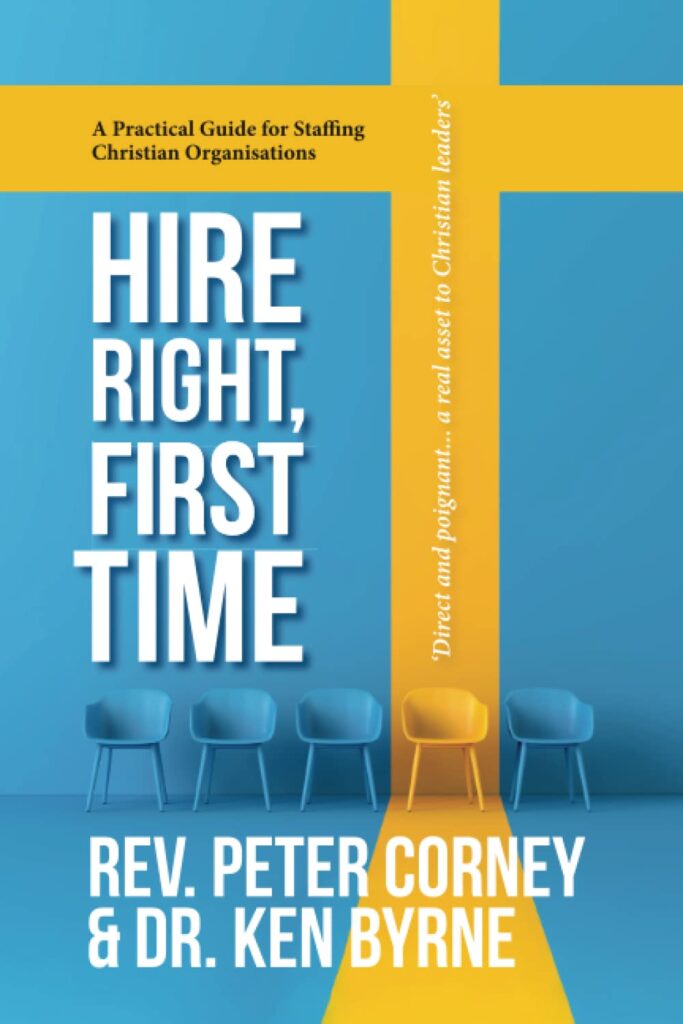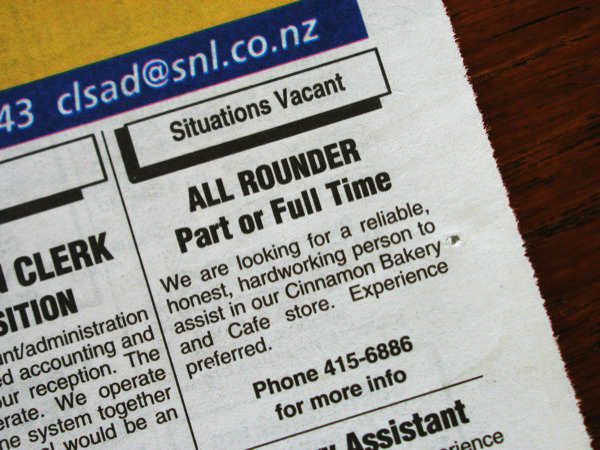The book’s name says it all: “Hire Right, First Time”, implying that Christian churches and organisations are getting hiring wrong. And that there is a better way to do it. The Other Cheek spoke to Corporate psychologist Dr Ken Byrne, who co-authored the book with well-known Melbourne minister Peter Corney.
Ken Byrne: It came about because I had been teaching at the Arrow Leadership Group for about 22 years, and every time I teach there, we do a session on working with people who probably shouldn’t have been hired. And in doing that, every year I heard again and again and again the problems that inevitably came back from a poor selection system. And I saw the pain of people trying to manage someone who didn’t fit the job description or didn’t fit the organisation.”
What’s top of your list of what people should be doing?
Ken Byrne: Three things. One is that churches hire quickly, and fire slowly, and their formula should be reversed. People should hire slowly and fire quickly. There are two major reasons for mistakes. One is people start with the wrong question. The first question should be, what will the impact be if we hire the wrong person? And that question has a way of sharpening people’s thinking and increasing their motivation to do it properly. The third thing is that there should be a structured selection system, which is prepared before you even begin hiring. And that means thinking about who the best people are to be on the selection committee. How are you going to do a telephone interview? What questions will you ask? How will you do the other interviews? How will you do the reference checking? And how will you make a final decision? All of that should be prepared before you even meet the first person or before you put a job ad in. And that’s what our book tells you in great detail.
One thing that I imagine you oppose is the Lone Ranger executive or minister simply hiring by themselves or hiring from their pool of mates or friends.
Ken Byrne: Absolutely. It’s a disaster because the most obvious thing is the person who’s being the candidate, who’s being considered, should meet the team they’re going to work with. They should meet anybody who reports to them. And those people should have some say in the hiring decision. And again, that has to be done in a structured way. And our book describes exactly how to do that. So you should [involve] everybody who will be affected by this person, they don’t have to be part of the selection committee, but they should at least meet the person.
And if the pastor is hiring from his pool of mates, you may not be getting the most suitable person.
And secondly, the pastor already has his preformed judgments about those people. And that halo or that bias is one of the important factors in hiring mistakes.
A subset of that is that the pastor will say, “Gee, he’s been really good at this other parish. You’ll be good at this parish.” And that’s one of the fundamental mistakes of hiring because every parish is different, and every parish has a different group of people, and there are different values and different unwritten rules. I’ve seen many, many hiring mistakes happen for just that reason. “He was good there, so he’ll be good here.” It doesn’t follow that he’ll be good here.
Throwaway lines
Ken, one of the fascinating chapters in your book is about interviews and what “clues” or “tells” people miss. Can you talk a bit about that?
Ken Byrne: One of the things is paying attention to throwaway lines. And people think that the critical thing to record is the answer, which it is. But the throwaway lines, which are often given as a joke, are often ignored.
For example, I spoke to one person, and I said to him, “Tell me about the stressful situation you’ve had to deal with at work.” He described the situation and described dealing with it effectively. And then his throwaway line was, “I felt like I was grasping a straw in the ocean.” Now, think about that.
How would you feel if you were grasping a straw in the ocean? That doesn’t fit with dealing with a stressful situation successfully. That’s a very important giveaway.
[And there’s the] jokes people make. Someone said to me when I asked about his style of management, he said, “I was a bit like Hitler, but nah, I was only kidding.” Well, that joke tells you a great deal. So, throwaway lines are a very important aspect of listening.
The second tell is what people avoid mentioning. For example, in a resume, someone says they were employed from January 2019 to 2021. Unless you know the month, the person might’ve been employed for 13 months, not two years.
So you want to get the exact details of the year and the month. When people give references, you want references from past supervisors or bosses. Those are the only ones worth checking. You don’t want references from friends, colleagues or teammates. If they give those references, it’s another tell. Now, those are just a few. There are many, many clues that people give, and we go into that great detail in the book.
Are references worth it?
I really appreciated that chapter. The Christian community is fairly small, especially in this country. So, do references really work?
Ken Byrne: Well, it depends on who does them and how well they’re done. At one end of the spectrum, you have reference checking like I’ve often been asked for from employment agencies, and they’re extremely superficial and they’re not designed to get real information.
On the other hand, we have, I think, 17 questions, and the reference check is a type of interview.
So the first step is that one person on the selection committee should be doing a reference check and this can’t be delegated to someone else.
It begins with establishing rapport with the person who’s giving the reference and helping them see the importance of getting the right person. And then starts with very easy questions that the person should have no trouble answering but will give you useful information. But the questions then gradually become more and more probing and more and more difficult. And if that’s done well, you have a very good chance of getting useful information.
But if it’s “How good was the person,” “What were their weaknesses?” “Thanks very much for talking to me.” Done. In 10 minutes, you have Buckley’s chance and keep in mind that one of the reasons you get these “good” superficial references is when the person is a problem performer they’re trying to get rid of.
You write, and I’m not sure whether it was Peter or you, “Values are led by the people at the top. If the leader is a bully and tolerates or reinforces this kind of behaviour on staff, you can expect it will become more accepted as organisational behaviour.” Do you need to write another book advising job applicants, on where to avoid working?
Ken Byrne:
Well, I’ve thought about that, but writing a book in Australia is a very, very difficult proposition to even make a dollar on it. Indeed, it’s very tough. And I’ve gotten a bit older and a bit wiser. So I think the book could be written, but I think it’s easier to simply give advice. When I speak to people who are applying for jobs, there’s a series of questions they should ask when they’re being considered for a job, and they should ask to meet other people who work there before they agree to sign on.
The Other Cheek got a promise that we can do a follow-up with Ken Byrne and we’ll do our best to get that list of questions out of him.

Hire Right First Time,
Rev. Peter Corney and Dr. Ken Byrne, Arrow 2023. $29 Available on Amazon


As a jobseeker who has had interviews in both the secular and faith based arenas, it saddens me that some of the most inappropriate and unhealthy hiring practices/interview questions have been from faith based organizations. Perhaps I could buy a few copies of this book and send it to them.
I think you should!